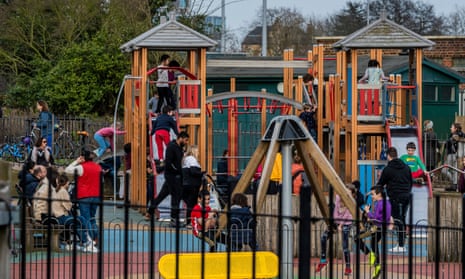Primary-age children in Britain are losing the freedom to play independently and typically are not are allowed to play outside on their own until two years older than their parents’ generation were, according to research.
While their parents were allowed to play outside unsupervised by the age of nine on average, today’s children are 11 by the time they reach the same milestone, according to the study, which says not enough adventurous play could affect children’s long-term physical and mental health.
One expert said the findings showed that British children had been subject to “a gradual, creeping lockdown over at least a generation”.
Researchers asked more than 1,900 parents of five-to-11-year-olds about their children’s play for the British Children’s Play Survey, the largest study of its kind. They found that children averaged three hours of play a day over the course of a year, around half of which took place outside.
The average age a child was allowed to play outside alone was 10.7 years, while their parents recalled being allowed out before their ninth birthday (8.9 years on average). In line with previous studies, the findings confirm that children play less as they get older.
“In the largest study of play in Britain, we can clearly see that there is a trend to be protective and to provide less freedom for our children now than in previous generations,” said Helen Dodd, a professor of child psychology at the University of Reading, who led the study.
“The concerns we have from this report are twofold. First, we are seeing children getting towards the end of their primary school years without having had enough opportunities to develop their ability to assess and manage risk independently. Second, if children are getting less time to play outdoors in an adventurous way, this may have an impact on their mental health and overall wellbeing.”
Dr Tim Gill, the author of Urban Playground: How Child-friendly Planning and Design Can Save Cities, said: “Thanks to the pandemic, we all know what lockdown feels like. This groundbreaking study shows that British children have been subject to a gradual, creeping lockdown over at least a generation.
“The reasons are different, with social changes, safety fears, technology and traffic growth all arguably playing a part. However, the end result for all too many children is the same: boredom, isolation, inactivity and poorer mental and physical health. The consequences for their development and wellbeing should not be underestimated.”
The study, published in the International Journal of Environmental Research into Public Health, found that children who were white, not first-born and whose parents had a higher level of education were allowed out at a younger age.
It found that children in Scotland were allowed out at the youngest age, a year before those in Wales and all regions of England.
The study cited concerns that modern children’s playgrounds are not sufficiently challenging. “It is therefore vital that children’s play spaces are evaluated for the play opportunities, or affordances, that they offer, and not simply on the basis of maximising safety and minimising cost.”
Anita Grant, the chair of Play England, said: “Play outdoors is fundamentally important for children to develop a sense of self and a relationship with the world around them. Adults’ protective instincts are not helpful when they restrict and control exploration, creativity and a child’s natural instinct to engage with their environment freely.”










